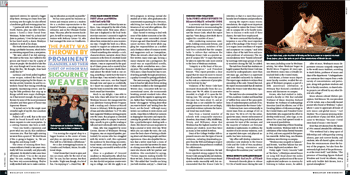Julia Glass Breaks Rules
 As an avid reader of fiction by new authors, I was intrigued by the title of Julia Glass’s debut novel, Three Junes, when I first saw it displayed in the local bookstore last summer. I assumed it might be about three women with the same name whose lives intersected in some mysterious way. I bought the book on a whim, mainly to support an unknown writer, and hoped for the best. When I got home, I found something else entirely—a rich, character-driven narrative about three summers in the lives of a Scottish family whose members live on both sides of the Atlantic. I was so impressed by the quality of Glass’s prose and so moved by her treatment of her characters’ deaths that I read almost the whole book in one sitting, something I rarely have the time to do these days. I was excited to discover a marvelous new voice, one that leaped through time and space so confidently. So I wasn’t too surprised when I heard that the book received the 2002 National Book Award last November.
As an avid reader of fiction by new authors, I was intrigued by the title of Julia Glass’s debut novel, Three Junes, when I first saw it displayed in the local bookstore last summer. I assumed it might be about three women with the same name whose lives intersected in some mysterious way. I bought the book on a whim, mainly to support an unknown writer, and hoped for the best. When I got home, I found something else entirely—a rich, character-driven narrative about three summers in the lives of a Scottish family whose members live on both sides of the Atlantic. I was so impressed by the quality of Glass’s prose and so moved by her treatment of her characters’ deaths that I read almost the whole book in one sitting, something I rarely have the time to do these days. I was excited to discover a marvelous new voice, one that leaped through time and space so confidently. So I wasn’t too surprised when I heard that the book received the 2002 National Book Award last November.
Much to my delight, I was able to hear Julia Glass talk about her work at Wesleyan because she inaugurated the Joan Jakobson Visiting Writer Program with a reading and a lecture at Russell House in February. With the generosity of Joan and John Jakobson ’52, P ’05, who have supported Wesleyan writing projects over the years, this program is intended to bring an author to campus for several days, usually to give a public reading or talk and meet informally with students.
Glass, who was suggested by Anne Greene, director of Wesleyan’s Writing Programs, was an inspired speaker, particularly for anyone who has struggled with the writer’s craft. She captivated the audience by describing unconventional twists and turns along her path to becoming a successful novelist at the age of 46.
Glass is a graduate of Concord Academy in Massachusetts, which has produced a number of professional writers. But she did not pursue creative writing in college, nor did she apply to an MFA program in writing; instead she studied art at Yale. After graduation she concentrated on painting for a few years, exhibiting her work at the Brooklyn Museum of Art and other galleries. She even designed hats for a time.
Glass turned to writing to deal with some of the darker moments in her life. Her younger sister committed suicide 10 years ago and Glass herself is a breast cancer survivor. She wrote while juggling her responsibilities as a mother and a freelance editor of romance novels and magazines such as Cosmopolitan. When she revised a short story she had first written many years ago, turning a minor character into a protagonist, the result was an unpublished novella, Collies, which nevertheless won a literary prize. The novella was expanded into Three Junes. Glass found her way to novel writing partially through persistence, a quality essential for getting published.
The next morning I had the good fortune to hear her talk about fiction writing to students enrolled in the Distinguished Writers class. Consistent with her unconventional career, she recommends breaking several standard rules often prescribed by the experts to aspiring writers. Rather than “writing about what you know,” she suggests “writing about what you want to know” and “writing from the heart, not the head.” Although many writers use outlines to write stories and novels, Glass likes to follow her instincts in shaping her characters and enjoys discovering the growth of a character, rather like a psychotherapist dealing with a client. She doesn’t see any imperative to keep a journal or write every day. Write when you can make the time, she said, since the lion’s share of writing is thinking about and observing people and their experiences. Glass also dispelled the notion that a writer must have a room of one’s own since she has written for years at a dining room table in the small apartment she shares with her partner and children. She concluded by saying, “Fiction requires making trouble for those we love…fiction is only about trouble.” She added that “trouble can bring you both wisdom and joy.”

